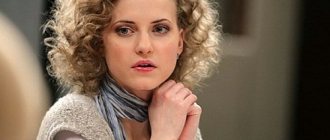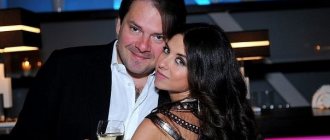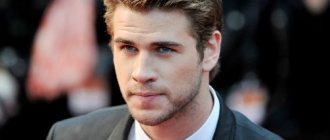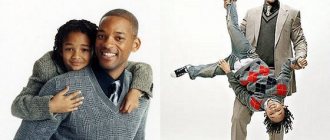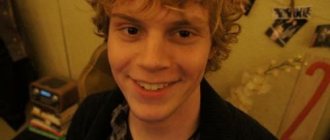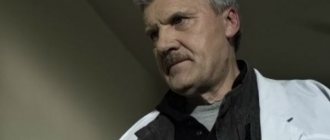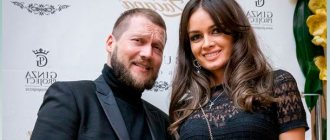Wikipedia has articles about other people with the surname Manucharov.
| Vyacheslav Manucharov | |
Vyacheslav Manucharov at his 30th birthday party | |
| Birth name: | Vyacheslav Rafaelevich Manucharov |
| Date of Birth: | October 6, 1981(1981-10-06) (age 38) |
| Place of Birth: | Moscow, USSR |
| Citizenship: | USSR USSR Russia Russia |
| Profession: | actor |
| Career: | 1999–present |
Vyacheslav Rafaelevich Manucharov
(born October 6, 1981, Moscow) - Russian theater and film actor, TV presenter.
Content
- 1 Biography
- 2 Personal life
- 3 Recognition and awards
- 4 Theater works 4.1 Graduation performance
- 4.2 Russian academic youth theater
- 4.3 Autonomous non-profit organization “Theater Marathon”
- 4.4 Theater agency "Art-Partner XXI"
- 4.5 Variety Theater named after A.I. Raikin
Biography
Born into the family of the director of the first fur factory in Moscow, Rafael Manucharov, and the director of the Charodeyka hairdressing salon, Nadezhda Shepeleva-Kopeiko. Vyacheslav comes from the ancient Armenian family of Manucharyants (this was the original surname of the actor’s paternal ancestors); on his mother’s side, he traces his history back to an old noble family of native Muscovites, the Shepelev Princes, who were directly related to the Musins-Pushkins. His grandmother, Shushanika Manucharyants, was V.I. Lenin’s personal secretary and librarian[1]. He did not go to kindergarten; his grandmother, the general’s wife, was involved in his upbringing; Vyacheslav constantly spent summers at the general's government dachas: in Peredelkino, Tskhaltubo (Georgia) and Saulkrasti (Latvia)[2].
Vyacheslav studied at a school with a chemical focus at the Chemistry Department of Moscow State University. As a schoolboy, he began acting in Simple Truths, the first Russian youth series. In 2003 he graduated from the Higher Theater School. B.V. Shchukin (course of Rodion Ovchinnikov).
From 2003 to 2009 he worked at the Russian Academic Youth Theater.
In 2009, the film “Tender May” was released, where Vyacheslav plays the main role - Andrei Razin. The film was successfully screened in Russia and the CIS countries.
Since 2012, he has been collaborating with the A.I. Raikin Variety Theater (St. Petersburg).
Film debut
Vyacheslav Manucharov studied at a comprehensive school, and at the same time learned the basics at another school - an acting school. And already as a schoolboy he began to appear on film sets. He starred in the first Russian youth series called “Simple Truths.”
Vyacheslav Manucharov. Popular actor
Slava got involved in the project at a time when work on the second block had already begun. Then the series itself had already begun to be shown on TV and it managed to become quite popular among viewers. It happened that young people could not leave the school where the series was filmed, because teenagers were greeted with flowers and cameras, literally at every approach. There was no end to people wanting an autograph.
By the way, the creators of “Simple Truths” involved only debutants in the project. Therefore, early popularity could turn the heads of young actors. However, Vyacheslav was spared the so-called “star fever”. However, participation in the series gave a lot to the aspiring actor from a professional point of view.
Theater works
Graduation performance
- “Beautiful People” based on the play by I. S. Turgenev “A Month in the Country” (dir. Pavel Safonov) - Shpigelsky
Russian Academic Youth Theater
- 1989 - “The Adventures of Tom Sawyer” M. Twain (dir. John Cranny) - Joe Harper
- 1999 - “Dunno the Traveler” N. N. Nosov (dir. Alexey Borodin) - Pilyulkin
- 2001 - “Lorenzaccio” by A. de Musset (dir. Alexey Borodin) - Venturi
- 2002 - “Erast Fandorin” based on the novel “Azazel” by B. Akunin (dir. Alexey Borodin) - Akhtyrtsev, Conductor on the Train
- 2004 - “Forever” A. Ibsen (dir. Trass Raivo) - Essi, friend of the groom
- 2004 — “The Cherry Orchard” by A. P. Chekhov (dir. Alexey Borodin) — Guest
- 2005 - “A Purely English Ghost” by E. Yu. Narshi based on O. Wilde’s novel “The Canterville Ghost” (dir. Alexander Nazarov) - Duke of Cheshire
- 2005 - “Lord of the Flies” by W. Golding (dir. Alexander Ogarev) - Simon
- 2006 - “Suicide” N. R. Erdman (dir. Veniamin Smekhov) - Yegorushka
- 2006 - “Cinderella” E. L. Schwartz (dir. Alexey Borodin) - Wizard, Corporal
- 2008 — “On the Mute” (musical and poetic solo performance)
Autonomous non-profit organization "Theater Marathon"
- 2010 - “Cunning and Love” F. Schiller (dir. Nina Chusova) - Marshal von Kalb
- “Pygmalion” (dir. Pavel Safonov) - Freddie
[5]
Theater agency "Art-Partner XXI"
- 2013 - “A neighbor for a week, no more!” K. Michel (dir. Valery Garkalin) - Paul
[6]
Variety Theater named after A.I. Raikin
- 2012 - “The Imaginary Patient” (dir. Nina Chusova) - Argan
[7]
A television
- From January 1, 2008 to December 2011, he was an actor in the parody show “Big Difference” on Channel One. Vyacheslav parodied: Marat Basharov (1st, 14th issue), Sergey Zverev (1st issue), Sergey Bezrukov (1st issue), Andrey Kurpatov (1st issue), Ildar Zhandarev (3rd issue), Ivan Urgant (6th and 11th issues), Vadim Galygin (issues 6 and 14), Andrey Malakhov (issues 6 and 10), Stas Kostyushkin (issues 8 and 19), Arsen Wenger (issue 9), Victor Koklyushkin (issues 9 and 18), Nikolai Tsiskaridze (issue 15), Vladislav Vetrov (15 issue), Vladislav Flyarkovsky (15 issue), Hugo Weaving (17 issue), Alexey Egorov[8] (16 issue), Anton Savlepov (16 issue), Nikolai Gogol (19 issue), Dima Bilan (20 issue ), Ivan Mokhovikov (issue 20), Igor Starygin (issue 21), Dmitry Shepelev (issue 21), Alexander Maslyakov Jr. (issue 23), Ilya Oleynikov (Olivier show 2010), Georgy Vitsin (Olivier show 2010), Daniel Radcliffe (05/30/2010), Thomas Anders (Modern Talking) (Big Difference in Odessa 2010) and Alexander Volkov (issue 43)[9].
- From September 19 to October 24, 2010, he participated in the show “Ice and Fire” on Channel One (6 episodes)[10]. His partner was Anna Semenovich.
- From January 10 to July 9, 2011, he hosted the popular science series “Taste of Life” on Channel One (16 episodes)[11]. His co-host was Victoria Agapova.
- From March 1, 2011 to February 28, 2013, he was a correspondent for the “I Want to Know” program on Channel One[12].
- From November 15, 2011 to March 18, 2013, he hosted the show “10 Reasons to Fall in Love” (4 seasons, 92 episodes) on “Muz-TV” and “”[13]. His co-host in the first season was Maria Kozhevnikova.
- From February 18 to July 14, 2012, he hosted the show “Cosmopolitan: Video Version” on Muz-TV[14]. His co-hosts were Miroslava Karpovich and Arina Perchik.
- From April 2 to May 3, 2012, he ran the information and entertainment magazine “Rich and Famous” on the STS channel (20 issues)[15]. His co-host was Andrey Razygraev.
- On June 1, 2012, he hosted the X annual national award in the field of popular music Muz-TV 2012. His co-hosts were Maxim Galkin and Lera Kudryavtseva.
- On June 10, 2012, he held a talk show “MUZTV Award #let's see each other” on the Muz-TV channel.
- From September 22 to October 20, 2012 he hosted the show “Happiness! Video version" on the TV channel "" (5 episodes). His co-host was Victoria Lopyreva.
- From October 7 to December 9, 2012, he was a member of the jury of the show “ShowaStgown” on the New Channel (10 episodes).
- From August 31, 2013 to January 5, 2014, he hosted the music show “You Can’t Take Words Out of a Song!” on the NTV channel (10 episodes)[16].
- Starting in September 2020, the culinary show “Who’s Who in the Kitchen” will start on the STS channel, in which Vyacheslav will act as the host[17].
- Since September 2020, he has been a participant in the Kinoshow project on the NTV channel.
Apartment of Vyacheslav Manucharov
The artist rented an apartment on Frunzenskaya Embankment for several years from the daughter of the writer Vera Leon, and when the opportunity arose, he bought it from the owner and began major renovations.
Initially it was a three-room apartment, which turned into a two-room apartment, but with spacious premises. The renovation lasted about a year; the builders demolished absolutely all the walls except the load-bearing ones.
The interior turned out to be bright and sunny. Slava’s favorite place is the living room, which has enough space for both a relaxation area and a small office. There is an exquisite table made from a former Singer typewriter and chairs from the time of Peter the Great. Also hanging in the living room are many paintings by Rustam Khamdamov, a longtime family friend. Pumpkins and angels are placed on the floor and tables. Vyacheslav has been collecting both of them for many years.
The living room is connected to a small kitchen, where there is a work table with a stove and a refrigerator, on which stands a horse brought from the Arkhangelsk region. For the sake of this wooden horse, they had to buy a whole house, since one horse was not sold.
The design also included a dressing room. A small room the size of a closet is located next to the bedroom.
The bedroom is the most comfortable and simple place; there is absolutely no unnecessary furniture here. The main place is occupied by the bed, angels hang on the walls, and next to it there is a large floor-length mirror and several paintings that have not yet found a place.
The bathroom is completely tiled with brown and beige mosaics.
According to CIAN, a three-room apartment on Frunzenskaya Embankment costs from 21 to 79 million rubles.
Filmography
- 1999 - 2003 - Simple truths - Pavel Belkin
- 2002 - My border - Bormutov, private
- 2002 - Ark
- 2003 - Honeymoon - Nikolai
- 2003 - Russian Ark - soldier
- 2003 - Miracle Park
- 2004 - Book Thieves - Cheeked
- 2004 - Detectives 3 (film 9. “On a tram ticket”) - second pickpocket
- 2005 - Adjutants of Love - Eugene Beauharnais
- 2005 — Airport (episode 22. “Preacher”)
- 2006 - 2008 - Law and order. Criminal intent - Rudik, pathologist
- 2006 - Code of Honor 3 (film 1. “Dirty Money”) - Grisha
- 2006 - Paparatsa - Anton
- 2007 - Tuxedo in Ryazan - Semyon Ratko, Pakhmutov’s companion
- 2007 - Daddy's daughters - guest worker
- 2008 - Dangerous Liaison - Igor
- 2008 - Five steps on the clouds - event host
- 2009 - Tender May - Andrey Razin
- 2009 - Anna Karenina - Nikolai Shcherbatsky
- 2009 - Reflections - Igor Dmitrievich Shevtsov
- 2009 - The last carriage
- 2010 - Capercaillie in the cinema - Oleg Petrovich Zinkevich
- 2010 - House of exemplary maintenance - Igor
- 2010 - Chronicles of Betrayal - Egor
- 2010 - Robinson - Sergei Balayan
- 2010 - Diamonds
- 2011 - Carrot Love 3 - Misha
- 2011 - My crazy family - Maxim, Vika’s ex-fiancé
- 2011 - Diamonds. Kidnapping - Salesperson in a Jewelry Store
- 2011 - My paw
- 2012 - There is happiness - Pavel Kamensky, teacher
- 2013 - Country of Good Children - Plenipotentiary Representative
- 2014 - Goodbye, boys - Alexey Egorov, NKVD investigator
- 2014 - Boys + girls = - Flat
- 2015 — Rating (in production)
- 2015 - Guardian (in production)
- 2015 — Not yet (in production)
Notes
- Ekaterina Filimonova.
[www.1tv.ru/public/pi=18675 Vyacheslav Manucharov: “If I had not lost 40 kilograms, Semenovich would not have lifted me”]. 7 days. Retrieved June 2, 2012. [www.webcitation.org/69jx8KZQk Archived from the original on August 7, 2012]. - [rusakters.ru/manucharov-vyacheslav.html Manucharov Vyacheslav]
- [www.eg.ru/daily/cadr/22193/ Anna Semenovich’s partner became a dad]
- [super.ru/news/113820 Actor Vyacheslav Manucharov gave birth to a daughter in America - SUPER.ru]
- [www.teatr-m.ru/spectakli/106-pigmalion Performance “Pygmalion”]
- [www.artpartner.ru/performances/22 Performance “A neighbor for a week, no more!”]
- [www.estrada.spb.ru/sobstvennii-repertuar/item/21-%D0%BC%D0%BD%D0%B8%D0%BC%D1%8B%D0%B9-%D0%B1%D0%BE %D0%BB%D1%8C%D0%BD%D0%BE%D0%B9 Performance “The Imaginary Ill”]
- Host of the program “The History of All-Russian Deception” (NTV)
- [www.1tv.ru/sprojects/si=5734 Page of the show “Big Difference” on the website of Channel One]
- [www.1tv.ru/sprojects/si=5812 Page of the show “Ice and Fire” on the website of Channel One]
- [www.1tv.ru/documentary/fi=6633 Page of the series of programs “Taste of Life” on the website of Channel One]
- [www.1tv.ru/sprojects/si=5719 Page of the “I Want to Know” program on the Channel One website]
- [muz-tv.ru/look/10povodov/ Page of the show “10 reasons to fall in love” on the website of the Muz-TV channel]
- [muz-tv.ru/look/p803/ Page of the show “Cosmopolitan: Video version” on the website of the Muz-TV channel]
- [ctc.ru/projects/show/bogatye-i-znamenitye/ Page of the “Rich and Famous” magazine on the STS channel website]
- [www.ntv.ru/peredacha/Iz_pesni_slov_ne_vikinesh/last23983825/ Page of the show “You Can’t Eliminate Words from a Song” on the NTV channel website]
- [ctc.ru/projects/serials/kto_kogo_na_kuhne/ Page of the show “Who wins in the kitchen” on the STS channel website]
- [manucharov.com/audio/ Official website of the theater and film actor]
Personal life
It is known that the personal life of Vyacheslav Manucharov, a charming, popular and highly paid artist, is busy. The actor is almost always surrounded by famous beauties.
Manucharov's first wife was Victoria Seliverstova, a physician by training who graduated from the Medical University. I. Sechenov. But the couple lived together for only a year. They had a daughter, Arina. It seemed that it was a happy marriage, which was not overshadowed by anything. Therefore, all Manucharov’s acquaintances were surprised to learn about the couple’s separation. Vyacheslav himself lifted the veil of secrecy. The artist admitted that he was not ripe for a responsible family life.
Vyacheslav Manucharov with his first wife Victoria
Falling in love and the desire to exist without constraining oneself in any way could not accompany a happy and strong family. After the divorce, the ex-wife forbade Vyacheslav to see his daughter. But the artist does not forget Arina and regularly congratulates his eldest daughter from the pages of his own Instagram account.
The tabloids regularly write about Vyacheslav Manucharov’s novels – imaginary and real. The artist and TV presenter were credited with relationships with famous beauties - Victoria Lopyreva and designer Anastasia Belovolova. Sometimes the media gets provocative material about an artist’s unconventional orientation. In 2012, Vyacheslav attended Volvo Fashion Week in Moscow in the company of the outrageous Mitya Fomin. But Vyacheslav put an end to journalists’ speculations on his own microblog on Twitter.
Vyacheslav Manucharov and Dora Nadezhdina
In 2015, Manucharov had a second daughter, Nina, who was born to his common-law wife Dora Nadezhdina, an American of Russian origin.
Links
- [manucharov.com/ Official website]
- [thebestphotos.ru/archives/2809 Interview with Vyacheslav Manucharov to the portal TheBestPhotos.ru]
- [ru.hellomagazine.com/zvezdy/intervyu-i-video/35-vyacheslav-manucharov-o-rabote-i-kardinalnom-izmen.html Interview with HELLO! magazine]
- [www.youtube.com/watch?v=Xmv1EEmtNtA Vyacheslav Manucharov part 1. Press in Ukraine]
- [www.youtube.com/watch?v=AEqxntdaZRU Vyacheslav Manucharov part 2 Press in Ukraine]
- [www.youtube.com/watch?v=ZvGeJ1RUSMs V. Manucharov, actor of the program “Big Difference”]
- [www.youtube.com/watch?v=Wemt__U_6ms “Cinema in detail.” Vyacheslav Manucharov 12/16/2013]
- [www.youtube.com/watch?v=DWUl1227wMs “At lunch”: Vyacheslav Manucharov - on how to become famous (2014)]
- [www.youtube.com/watch?v=L7ZVHiy0niY “Truth 24”: My talent is not fully revealed - Vyacheslav Manucharov (2015)]
- [www.youtube.com/watch?v=uNhNQOWLQ3I “In the dressing room” - interview 2013]
- [www.youtube.com/watch?v=wXXkLjX4Rls Open conversation. Vyacheslav Manucharov]
- [www.youtube.com/watch?v=yQUzgMr-xYM Stars of the big city - Vyacheslav Manucharov]
- [www.youtube.com/watch?v=kY-pnxqjQaI Performance “On the Mute”]
- [www.tvigle.ru/video/interviu-s-viacheslavom-manucharovym/ V. Manucharov about meeting S. Solovyov]
Excerpt characterizing Manucharov, Vyacheslav Rafaelevich
The peasants say that a cold wind blows in late spring because the oak bud is unfurling, and indeed, every spring a cold wind blows when the oak tree is unfurling. But although the reason for the cold wind blowing when the oak tree unfurls is unknown to me, I cannot agree with the peasants that the cause of the cold wind is the unfurling of the oak bud, only because the force of the wind is beyond the influence of the bud. I see only the coincidence of those conditions that exist in every life phenomenon, and I see that, no matter how much and in what detail I observe the hand of a clock, the valve and wheels of a locomotive and the bud of an oak tree, I do not recognize the reason for the bell, the movement of the locomotive and the spring wind . To do this, I must completely change my point of observation and study the laws of the movement of steam, bells and wind. History should do the same. And attempts to do this have already been made. To study the laws of history, we must completely change the subject of observation, leave kings, ministers and generals alone, and study the homogeneous, infinitesimal elements that lead the masses. No one can say how much it is possible for a person to achieve an understanding of the laws of history through this way; but it is obvious that on this path only lies the possibility of grasping historical laws and that on this path the human mind has not yet put one millionth of the effort that historians have put into describing the acts of various kings, generals and ministers and in presenting their considerations on the occasion of these acts . The forces of twelve languages of Europe rushed into Russia. The Russian army and population retreat, avoiding a collision, to Smolensk and from Smolensk to Borodino. The French army, with ever-increasing speed, rushes towards Moscow, towards the goal of its movement. The strength of its swiftness, approaching the target, increases, just as the speed of a falling body increases as it approaches the ground. A thousand miles away is a hungry, hostile country; There are dozens of miles ahead, separating us from the goal. Every soldier of the Napoleonic army feels this, and the invasion is approaching by itself, by sheer force of swiftness. In the Russian army, as they retreat, the spirit of bitterness against the enemy flares up more and more: retreating back, it concentrates and grows. There is a clash near Borodino. Neither one nor the other army disintegrates, but the Russian army immediately after the collision retreats just as necessarily as a ball necessarily rolls back when it collides with another ball rushing towards it with greater speed; and just as inevitably (although having lost all its strength in the collision) the rapidly scattering ball of invasion rolls over some more space. The Russians retreat one hundred and twenty versts - beyond Moscow, the French reach Moscow and stop there. For five weeks after this there is not a single battle. The French don't move. Like a mortally wounded animal, which, bleeding, licks its wounds, they remain in Moscow for five weeks, doing nothing, and suddenly, without any new reason, they run back: they rush to the Kaluga road (and after the victory, since again the battlefield remained behind them near Maloyaroslavets), without engaging in a single serious battle, they ran even faster back to Smolensk, beyond Smolensk, beyond Vilna, beyond the Berezina and beyond. On the evening of August 26, both Kutuzov and the entire Russian army were confident that the Battle of Borodino had been won. Kutuzov wrote to the sovereign in this way. Kutuzov ordered preparations for a new battle in order to finish off the enemy, not because he wanted to deceive anyone, but because he knew that the enemy was defeated, just as each of the participants in the battle knew it. But that same evening and the next day, news began to arrive, one after another, about unheard-of losses, about the loss of half the army, and a new battle turned out to be physically impossible. It was impossible to give battle when information had not yet been collected, the wounded had not been removed, shells had not been replenished, the dead had not been counted, new commanders had not been appointed to replace the dead, people had not eaten or slept. And at the same time, immediately after the battle, the next morning, the French army (due to that rapid force of movement, now increased as if in the inverse ratio of the squares of the distances) was already advancing by itself on the Russian army. Kutuzov wanted to attack the next day, and the whole army wanted this. But in order to attack, the desire to do so is not enough; there needs to be an opportunity to do this, but this opportunity was not there. It was impossible not to retreat to one transition, then in the same way it was impossible not to retreat to another and a third transition, and finally on September 1, when the army approached Moscow, despite all the strength of the rising feeling in the ranks of the troops, the force of things demanded so that these troops march for Moscow. And the troops retreated one more, to the last crossing and gave Moscow to the enemy. For those people who are accustomed to thinking that plans for wars and battles are drawn up by commanders in the same way as each of us, sitting in his office over a map, makes considerations about how and how he would manage such and such a battle, questions arise as to why Kutuzov didn’t do this and that when retreating, why he didn’t take up a position before Fili, why he didn’t immediately retreat to the Kaluga road, left Moscow, etc. People who are used to thinking like this forget or don’t know those inevitable conditions in which the activities of every commander in chief always take place. The activity of a commander does not have the slightest resemblance to the activity that we imagine, sitting freely in an office, analyzing some campaign on the map with a known number of troops, on both sides, and in a certain area, and starting our considerations with what some famous moment. The commander-in-chief is never in those conditions of the beginning of some event in which we always consider the event. The commander-in-chief is always in the middle of a moving series of events, and so that never, at any moment, is he able to think through the full significance of the event taking place. An event is imperceptibly, moment by moment, cut into its meaning, and at every moment of this sequential, continuous cutting of the event, the commander-in-chief is in the center of a complex game, intrigue, worries, dependence, power, projects, advice, threats, deceptions, is constantly in the need to respond to the countless number of questions proposed to him, always contradicting one another. Military scientists tell us very seriously that Kutuzov, much earlier than Filey, should have moved troops to the Kaluga road, that someone even proposed such a project. But the commander-in-chief, especially in difficult times, faces not one project, but always dozens at the same time. And each of these projects, based on strategy and tactics, contradicts one another. The commander-in-chief's job, it would seem, is only to choose one of these projects. But he cannot do this either. Events and time do not wait. He is offered, let’s say, on the 28th to go to the Kaluga road, but at this time Miloradovich’s adjutant jumps up and asks whether to start business with the French now or retreat. He needs to give orders now, this very minute. And the order to retreat takes us off the turn onto the Kaluga road. And following the adjutant, the quartermaster asks where to take the provisions, and the head of the hospitals asks where to take the wounded; and a courier from St. Petersburg brings a letter from the sovereign, which does not allow the possibility of leaving Moscow, and the rival of the commander-in-chief, the one who undermines him (there are always such, and not one, but several), proposes a new project, diametrically opposed to the plan for access to the Kaluga road; and the forces of the commander-in-chief himself require sleep and reinforcement; and the venerable general, bypassed by a reward, comes to complain, and the inhabitants beg for protection; the officer sent to inspect the area arrives and reports the exact opposite of what the officer sent before him said; and the spy, the prisoner and the general doing reconnaissance - all describe the position of the enemy army differently. People who are accustomed to not understanding or forgetting these necessary conditions for the activity of any commander-in-chief present to us, for example, the situation of the troops in Fili and at the same time assume that the commander-in-chief could, on September 1st, completely freely resolve the issue of abandoning or defending Moscow, whereas in the situation of the Russian army five miles from Moscow this question could not have arisen. When was this issue resolved? And near Drissa, and near Smolensk, and most noticeably on the 24th near Shevardin, and on the 26th near Borodin, and on every day, hour, and minute of the retreat from Borodino to Fili. Russian troops, having retreated from Borodino, stood at Fili. Ermolov, who had gone to inspect the position, drove up to the field marshal. “There is no way to fight in this position,” he said. Kutuzov looked at him in surprise and forced him to repeat the words he had said. When he spoke, Kutuzov extended his hand to him. “Give me your hand,” he said, and, turning it so as to feel his pulse, he said: “You’re not well, my dear.” Think about what you are saying. Kutuzov on Poklonnaya Hill, six miles from the Dorogomilovskaya outpost, got out of the carriage and sat down on a bench on the edge of the road. A huge crowd of generals gathered around him. Count Rastopchin, having arrived from Moscow, joined them. This whole brilliant society, divided into several circles, talked among themselves about the advantages and disadvantages of the position, about the position of the troops, about the proposed plans, about the state of Moscow, and about military issues in general. Everyone felt that although they had not been called to this, although it was not called that, it was a council of war. The conversations were all kept in the area of general issues. If anyone reported or learned personal news, it was said in a whisper, and they immediately went back to general questions: no jokes, no laughter, no smiles were even noticeable between all these people. Everyone, obviously with effort, tried to stay at the height of the situation. And all the groups, talking among themselves, tried to stay close to the commander-in-chief (whose shop was the center in these circles) and spoke so that he could hear them. The commander-in-chief listened and sometimes asked questions about what was being said around him, but he himself did not enter into the conversation and did not express any opinion. For the most part, after listening to the conversation of some circle, he turned away with a look of disappointment - as if they were not talking about what he wanted to know. Some spoke about the chosen position, criticizing not so much the position itself as the mental abilities of those who chose it; others argued that a mistake had been made earlier, that the battle should have been fought on the third day; still others talked about the Battle of Salamanca, which the Frenchman Crosard, who had just arrived in a Spanish uniform, told about. (This Frenchman, together with one of the German princes who served in the Russian army, dealt with the siege of Saragossa, foreseeing the opportunity to also defend Moscow.) In the fourth circle, Count Rastopchin said that he and the Moscow squad were ready to die under the walls of the capital, but that everything yet he cannot help but regret the uncertainty in which he was left, and that if he had known this before, things would have been different... The fifth, showing the depth of their strategic considerations, talked about the direction that the troops would have to take. The sixth spoke complete nonsense. Kutuzov's face became more and more concerned and sadder. From all the conversations of these Kutuzov saw one thing: there was no physical possibility of defending Moscow in the full meaning of these words, that is, it was not possible to such an extent that if some crazy commander-in-chief had given the order to give battle, then confusion would have occurred and the battles would have all it wouldn't have happened; it would not have been because all the top leaders not only recognized this position as impossible, but in their conversations they discussed only what would happen after the undoubted abandonment of this position. How could commanders lead their troops on a battlefield they considered impossible? The lower commanders, even the soldiers (who also reason), also recognized the position as impossible and therefore could not go to fight with the certainty of defeat. If Bennigsen insisted on defending this position and others were still discussing it, then this question no longer mattered in itself, but mattered only as a pretext for dispute and intrigue. Kutuzov understood this. Bennigsen, having chosen a position, ardently exposing his Russian patriotism (which Kutuzov could not listen to without wincing), insisted on the defense of Moscow. Kutuzov saw Bennigsen’s goal as clear as day: if the defense failed, to blame Kutuzov, who brought the troops to the Sparrow Hills without a battle, and if successful, to attribute it to himself; in case of refusal, to clear oneself of the crime of leaving Moscow. But this question of intrigue did not occupy the old man’s mind now. One terrible question occupied him. And he did not hear an answer to this question from anyone. The question for him now was only this: “Did I really allow Napoleon to reach Moscow, and when did I do it? When was this decided? Was it really yesterday, when I sent an order to Platov to retreat, or the evening of the third day, when I dozed off and ordered Bennigsen to give orders? Or even before?.. but when, when was this terrible matter decided? Moscow must be abandoned. The troops must retreat, and this order must be given.” To give this terrible order seemed to him the same thing as giving up command of the army. And not only did he love power, got used to it (the honor given to Prince Prozorovsky, under whom he was in Turkey, teased him), he was convinced that the salvation of Russia was destined for him and that only because, against the will of the sovereign and by the will of the people, he was elected commander-in-chief. He was convinced that he alone, even in these difficult conditions, could remain at the head of the army, that he alone in the whole world was able to know the invincible Napoleon as his opponent without horror; and he was horrified at the thought of the order he was about to give. But something had to be decided, it was necessary to stop these conversations around him, which were beginning to take on too free a character.
House of Vyacheslav Manucharov
A few years ago, the TV presenter bought fifty acres of land in the closed village of Krekshino. In two years, he built a three-story cottage and a small house, which, according to some media reports, is intended for the TV presenter’s mother.
The interior of the interior is still under development, but the main finishing work has already been completed. The main color is beige with dark brown accents. The style is minimalistic rustic. The work areas of the first floor are zoned with light marble and dark brown parquet.
The house, measuring just over a thousand square meters, is built of Angarsk pine, one of the walls is made of glass, the roof is covered with natural tiles. The site is surrounded by a fence made of natural stone; spruce and pine trees grow along the perimeter.
In addition to residential and guest premises, the mansion has a spa area, which includes: a gym, a Russian bath, a sauna and a swimming pool. Near the house there is a small font made of natural wood.
Between the one-story building and the main house there are stone paths, and the rest of the area is landscaped with grass. During construction, they decided not to remove separately growing trees, but to integrate them into the landscape.
According to CIAN, houses in the village of Krekshino cost from 15 to 84 million rubles and more.
